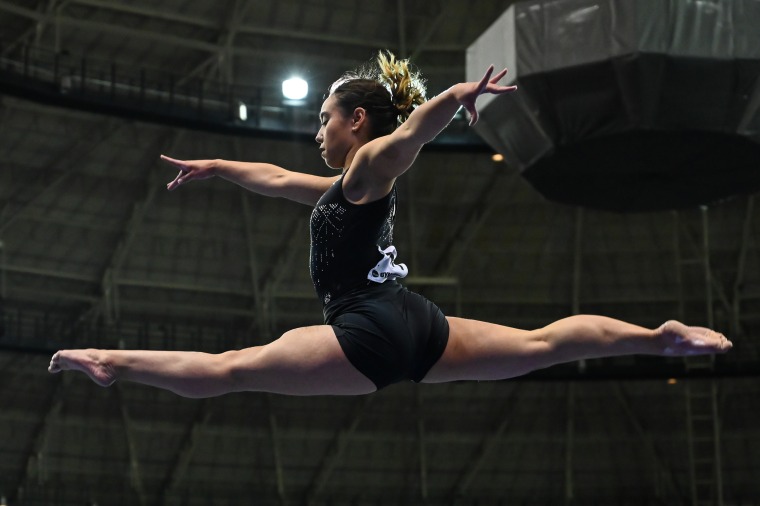As a little girl, I could not sit still until my parents told me it was time to go to the gym. But when I was 12 years old, I entered into the world of elite gymnastics and soon realized I was not walking into the same joy-driven, love-filled sport. I have said that gymnastics can be abusive and brutal. That was my experience. I felt trapped in a world where authority figures were dictating my future. But in actuality, it’s not the sport that is cruel. It’s the culture. The truth is, gymnastics is a beautiful sport that has allowed me to grow and learn invaluable life lessons: sacrifice, dedication, discipline. Eventually, it lead me to my voice.
I learned at a young age that my voice was not wanted or heard, so I went silent.
As an athlete you learn to keep pushing through the pain until the pain eventually becomes unbearable. Even then, you are told to continue. I learned at a young age that my voice was not wanted or heard, so I went silent. I did what I was told and set goals based on what everyone else expected of me. This may sound shocking, but I never dreamed about going to the Olympics. It was just something people expected of me. My voice was so suppressed, I couldn’t even hear it at times. I felt brainwashed. Everyone else’s normal was becoming my reality and I was heading towards a physical and mental burnout.
Despite the exhaustion, I kept getting better. I won the 2011 Visa Championships, the 2012 Pacific Rims and then the 2013 American Cup (the first and only senior elite competition of my elite career.) And yet, I have a vivid image of coming home in tears after that last competition. One of my vertebrates was protruding out from my spine, and I was in excruciating pain. I couldn’t even touch my back without cringing. At just 16 years old, I was told that my back would never be the same again. My wellbeing had been neglected for the opportunity to win a gold medal.
I was told I might not ever do gymnastics again. But when I heard those words, I wasn’t devastated; I wasn’t even sad. The truth is, a weight was lifted from my shoulders. A wave of calmness washed over me and drowned all of my self-doubt, fear and stress. I would never again have to wear a leotard or step foot in a gym, only to be criticized or judged based on my looks. It wasn’t until later that I realized how much I had relied on gymnastics for validation, for my self-worth.
When I stepped away from the sport, I was left with someone I didn’t even know. The only thing I did know was that I didn’t like who I was.
It took a full year to finally start missing the sport that I once loved as a little girl. After countless doctors appointments and imaging, I was allowed to start rehabbing and training again. But my body could no longer take the impact of the elite world, so I switched my path from the Olympics to college gymnastics.
I knew that UCLA had an amazing gymnastics program and so I called Miss Val. At that point, I still wasn’t sure if I would be able to do gymnastics again, but I knew I wanted to attend UCLA. She asked me about the last time I was happy in gymnastics. I told her it was when I was 11, before I entered the elite world. We talked for more than an hour, and by the time we hung up I knew that she cared about me, not just about my skills on the mat. Two years after the American Cup, I finally returned to the competition floor again, this time as a level 10 gymnast.
But it took some time to silence the negative voices in my head. During my freshman year of college, it became undeniably clear that I didn’t want to be great again. I correlated greatness with misery. But I now realize that greatness was not the problem. It was the culture and environment that seemed to come along with being great.
Miss Val, UCLA and my teammates have provided me with the trust and love I needed in order to reconnect with happiness. Too frequently, we hear about coaches and programs willing to win at any cost. Miss Val puts the human before the athlete. I was encouraged to use my voice and explore my passions outside of the sport. And when I did that, I was finally able to realize my true self-worth. I was more than that of a gymnast.
Ironically, once I realized this, my gymnastics career began to thrive again. The pressure of trying to be “perfect” was alleviated because the sport did not define me anymore. I found my joy. And that joy has given me all the success in the world.
Katelyn Ohashi scored a 9.950 for the Bruins in her final collegiate floor routine on Saturday at the 2019 NCAA women's gymnastics championships. UCLA finished third overall.
